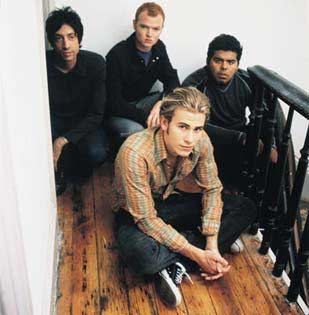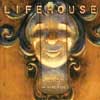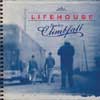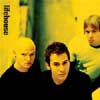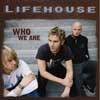Lifehouse
Genre: Pop
Official Web Site
Lifehouse Bibliography: (click on each album cover to view tracks and Lifehouse lyrics)
Lifehouse Biography Asked what kind of music can be found on Lifehouse's third album (simply titled Lifehouse), Jason Wade pauses and says, "the kind of music I like to write. That's one of the great things about having done a couple of records. I don't second-guess myself anymore. When I'm writing, I'm not trying to please everyone. My first question is: Do I like it?"
Wade proved himself a gifted songwriter with Lifehouse's first record, 2000's multiplatinum No Name Face, which spawned the #1 hit "Hanging by a Moment." Calling that song a hit, however, is a bit of an understatement as "Hanging by a Moment" was the most-played song of 2001 (according to BDS), the unequivocal airplay champ across the entire spectrum of radio formats.
For all its strengths, "Hanging by a Moment" was a hit because Jason Wade knows his way around a hook. This has never been more evident than it is on Lifehouse (set for release spring 2005, on Geffen Records).
Fronted by singer-guitarist Wade, powered by drummer Rick Woolstenhulme and transformed with the addition of bassist-singer Bryce Soderberg, Lifehouse is a rock band. But Wade's blossoming pop chops demand recognition. Indelible melodies, stacked harmonies, layered strings, Wurlitzer, B3, vibes-nimbly corralled by producer John Alagia-this is the stuff dreams are made of (check the Beatlesque gem "Chapter One" if you have any doubts).
Still, with Wade, it ain't all hearts and flowers; his lyrics are perhaps most often described as "moody," and this record is no exception (he counts Elliott Smith among his recent influences). He's a very private person, but he will say: "A while back I had a falling-out with someone I was really close to. I went through a hard time dealing with that, picking up the pieces. I'm not the kind of person who wants to sit down and have a long conversation about my feelings. That stuff tends to get worked out in the songs."
First single "You and Me" is one of the few love songs on the disc, but its tone is more stormy than romantic. "You know when you start to fall for someone but you're not sure if they return the feeling?" Wade muses. "You could be in a room full of people, but all you see is her. It's like being in the eye of a hurricane-everything else is swirling around you, but you're totally fixated on this person, and you're wondering, 'Does she feel it, too?'"
The tracks "Blind" and "Better Luck," on the other hand, are "more confrontational," says Wade. He's disarmingly candid about the latter, confiding: "My parents split when I was 12, and on some level I'm still dealing with it. I can face it now in a way I couldn't then. Sometimes I wonder if I'm ever gonna stop writing about stuff like that, but your scars become part of you."
Wade began writing songs around the time of that primal upheaval, and the craft is what sustains him to this day. "I write as much as possible, all the time," he says. "I love writing. It's my favorite part of all this."
"I grew up not really listening to much music," he points out. "But my mom turned me on to the Beatles, and they changed my life. I became obsessed with them. How can you not be? They're the best of the best." Delving deeper into the pop pantheon, he discovered the works of Todd Rundgren, Badfinger, the Raspberries and other masters of the form.
Some of the songs Wade wrote as a teenager landed on No Name Face, which came out when he was 20. The album took him and the rest of the band for a wild ride. He and Woolstenhulme still laugh about how "Hanging by a Moment" broke during what they fondly call the "Pearl Jam Porta Potty Tour." "Technically, we were on tour with Pearl Jam, but we were playing the side stage," Wade recalls. Woolstenhulme interjects: "We never actually met Pearl Jam, but we did sneak into their catering area and get kicked out by security," to which Wade adds, "We grabbed a couple of prawns on thhhe way out. But basically, we were playing for people on their way to the bathrooms."
"Hanging by a Moment," meanwhile, was about to change all that. "We were on this tour, and the song starts racing up the charts," Wade relates. "It was so crazy. The label flew us back to L.A. to do a video, and as soon as the video hit, the song just blew up. I look back on it now and I can't believe it."
Stanley Climbfall, the band's Top 10 follow-up, was released in 2002. It inspired a Los Angeles Times reviewer, for one, to assign it three stars and report: "Singer-guitarist Jason Wade makes rock that is inventive , igniting the occasional explosion of electric guitar, sounding barely contained by the emotional pop hooks at his fingertips" (Sept. 15, 2002).
Lifehouse headed off to crisscross not only the U.S. but the U.K., Europe and Australia. This time out, they played with the Rolling Stones (whom they actually did get to spend some time with). And then there were those shows with Iron Maiden. "We played with Iron Maiden in Germany," Wade informs. "They take their metal very seriously in Europe. We were sure we were gonna get killed onstage, but the crowd gave us the rock fist just like they did Iron Maiden." Lifehouse's sojourn in Europe ended with three sold-out performances in London at Shepherds Bush Empire.
By the time the band returned to the U.S., the faces at their label had changed. It was a time of transition. "We weren't sure where we were going; the future seemed uncertain," Wade confirms. "But I just decided to go for it. I kept writing songs and hoped for the best." "We'll Never Know," another of the standout tracks on Lifehouse, limns this period.
The songs Wade kept writing grew to a selection of more than 50. The dozen that finally made the cut for Lifehouse were recorded at producer John Alagia's home studio in Easton, Md., on the Chesapeake Bay in a record 5 weeks. Alagia is perhaps best known for his work with John Mayer, Rachel Yamagata, Liz Phair and Dave Mathews Band.
Says Woolstenhulme: "Making this record was totally nonchalant. There was practically no preproduction. We just showed up, put the mics up and played the songs. It was so simple." "John helped us not over think it," Wade says. "Because of that, this is the best representation of what we do when we're just being ourselves. We love the way this record sounds. It's fat and full, but it's not cluttered; you can hear all the instruments."
Speaking of instruments, Wade handled bass duties on several tracks (he also arranged strings), but much of the disc was recorded with session musician Stewart Meyers, who plays a mean Hofner, something recently recruited Lifehouse bassist Soderberg is looking forward to. "He played such great bass lines on the record," Soderberg says. "They're right up my alley, the way I like to play." (In fact, Soderberg is no stranger to Fab Four-influenced pop, having played in the L.A. band AM Radio. Nor is he unschooled in the ways of the road; though a self-described "hick from the sticks"-of Victoria, British Columbia-he rocked 10,000 screaming fans when AM Radio opened for Weezer at Budokan.)
With Soderberg on board, Wade says, "It feels like I'm 15 again. The three of us hang out all the time, play basketball, go out to eat. It feels right."
Operating on feel-personal and creative instinct-has served Wade and Lifehouse's new album well.
|


